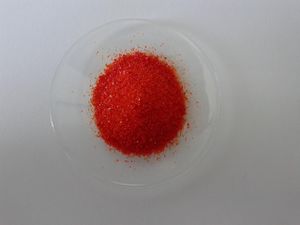Difference between revisions of "Potassium ferricyanide"
From Sciencemadness Wiki
(Created page with "{{distinguish|potassium ferrocyanide}} {{Chembox | Name = Potassium ferricyanide | Reference = | IUPACName = Potassium hexacyanoferrate(III) | PIN = | SystematicName = | Other...") |
(Added SMILES code, fixed consistency in infobox and put more emphasis on toxicity of hydrogen cyanide.) |
||
| (2 intermediate revisions by one other user not shown) | |||
| Line 45: | Line 45: | ||
| 3DMet = | | 3DMet = | ||
| Abbreviations = | | Abbreviations = | ||
| − | | SMILES = | + | | SMILES = C(#N)[Fe-3](C#N)(C#N)(C#N)(C#N)C#N.[K+].[K+].[K+] |
}} | }} | ||
| Section2 = {{Chembox Properties | | Section2 = {{Chembox Properties | ||
| Line 53: | Line 53: | ||
| BoilingPtC = | | BoilingPtC = | ||
| BoilingPt_ref = | | BoilingPt_ref = | ||
| − | | BoilingPt_notes = Decomposes | + | | BoilingPt_notes = (Decomposes) |
| Density = 1.89 g/cm<sup>3</sup> | | Density = 1.89 g/cm<sup>3</sup> | ||
| Formula = K<sub>3</sub>[Fe(CN)<sub>6</sub>] | | Formula = K<sub>3</sub>[Fe(CN)<sub>6</sub>] | ||
| Line 62: | Line 62: | ||
| MeltingPtC = 300 | | MeltingPtC = 300 | ||
| MeltingPt_ref = | | MeltingPt_ref = | ||
| − | | MeltingPt_notes = ( | + | | MeltingPt_notes = (Decomposes) |
| + | | Odor = Odorless | ||
| pKa = | | pKa = | ||
| pKb = | | pKb = | ||
| Line 106: | Line 107: | ||
| OtherFunction = | | OtherFunction = | ||
| OtherFunction_label = | | OtherFunction_label = | ||
| − | | OtherCompounds = [[Prussian blue]]<br>[[Potassium ferrocyanide]] | + | | OtherCompounds = [[Prussian blue]]<br>[[Potassium ferrocyanide]]<br>[[Sodium nitroprusside]] |
}} | }} | ||
}} | }} | ||
| Line 132: | Line 133: | ||
*Ferroxyl indicator solution | *Ferroxyl indicator solution | ||
*Make fake blood | *Make fake blood | ||
| + | *Make [[potassium cyanide]] | ||
==Handling== | ==Handling== | ||
| Line 137: | Line 139: | ||
Potassium ferricyanide has low toxicity, but solutions tend to stain. | Potassium ferricyanide has low toxicity, but solutions tend to stain. | ||
| − | Reaction with very strong acids may release [[hydrogen cyanide]] which is | + | Reaction with very strong acids may release [[hydrogen cyanide]] which is exceedingly toxic. |
===Storage=== | ===Storage=== | ||
| − | In closed bottles, away from strong acidic vapors. | + | In closed bottles, far away from strong acidic vapors. |
===Disposal=== | ===Disposal=== | ||
Latest revision as of 19:36, 22 August 2020
Not to be confused with potassium ferrocyanide.
 K3[Fe(CN)6] on a watchglass.
| |
| Names | |
|---|---|
| IUPAC name
Potassium hexacyanoferrate(III)
| |
| Other names
Red prussiate of potash
Prussian red Tripotassium ferriccyanide Tripotassium iron hexacyanide | |
| Identifiers | |
| Jmol-3D images | Image |
| |
| Properties | |
| K3[Fe(CN)6] | |
| Molar mass | 329.24 g/mol |
| Appearance | Dark red/red-orange crystals |
| Odor | Odorless |
| Density | 1.89 g/cm3 |
| Melting point | 300 °C (572 °F; 573 K) (Decomposes) |
| Boiling point | (Decomposes) |
| 464 g/L (20 °C) | |
| Solubility | Soluble in acids Slightly soluble in alcohols |
| Vapor pressure | ~0 mmHg |
| Hazards | |
| Safety data sheet | AcrosOrganics |
| Flash point | Non-flammable |
| Related compounds | |
| Related compounds
|
Prussian blue Potassium ferrocyanide Sodium nitroprusside |
| Except where otherwise noted, data are given for materials in their standard state (at 25 °C [77 °F], 100 kPa). | |
| Infobox references | |
Potassium ferricyanide is an iron coordination complex with the formula K3[Fe(CN)6].
Contents
Properties
Chemical
Reaction with a strong acid, such as conc. hydrochloric acid will release hydrogen cyanide:
- K3[Fe(CN)6] + 6 HCl → 6 HCN + FeCl3 + 3 KCl
Physical
Potassium ferricyanide is a deep red solid, soluble in water.
Availability
Potassium ferricyanide can be bought online.
Preparation
Potassium ferricyanide can be made by bubbling chlorine through a solution of potassium ferrocyanide.
- K4[Fe(CN)6] + ½ Cl2 → K3[Fe(CN)6] + KCl
Projects
- Classic photography
- Ferroxyl indicator solution
- Make fake blood
- Make potassium cyanide
Handling
Safety
Potassium ferricyanide has low toxicity, but solutions tend to stain.
Reaction with very strong acids may release hydrogen cyanide which is exceedingly toxic.
Storage
In closed bottles, far away from strong acidic vapors.
Disposal
No special disposal is required, though try not to dump large amounts at once.
References
Relevant Sciencemadness threads
Categories:
- Chemical pages without CAS Registry Number
- Articles without EBI source
- Chemical pages without ChemSpiderID
- Chemical pages without DrugBank identifier
- Articles without KEGG source
- Articles without InChI source
- Articles without UNII source
- Articles containing unverified chemical infoboxes
- Chemical compounds
- Inorganic compounds
- Potassium compounds
- Iron compounds
- Cyanides
- Polyatomic ions
- Coordination complexes
- Cyanide complexes
- Materials unstable in acidic solution